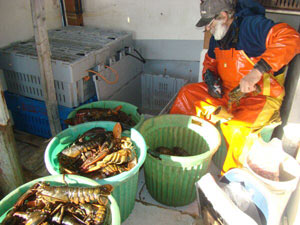 “Global warming might make the Gulf of Maine colder. The Gulf is effected both by cold Labrador Sea water that comes down from Greenland and also by the Gulf Stream. Maine is in fact colder than in the recent past.” “Global warming might make the Gulf of Maine colder. The Gulf is effected both by cold Labrador Sea water that comes down from Greenland and also by the Gulf Stream. Maine is in fact colder than in the recent past.”
— Dave Townsend, Marine Biologist, University of Maine
Chessie Johnson photo © 2007
|
Some areas of the ocean, Steneck said, are carbonate-rich; others are carbonate-starved. In areas with a lot of carbonate, he said, it is easy for shellfish to grow their shells. In carbonate-starved waters, that’s more difficult to do, and requires more energy.
How does this situation occur? Levels of carbon dioxide, the “greenhouse gas,” are zipping up. The oceans absorb the carbon dioxide.Carbon dioxide plus salt water produces carbonic acid. Any acid dissolves the shell ingredient, calcium carbonate.According to scientists, who record carbon dioxide levels by pulling ice cores from deep in Arctic Ice, and examining gas bubbles in amber, the rate in the increase of acidity of ocean water is greater than at any time in the last 20 million years.
The last big crisis, Steneck noted, was a huge increase in the carbon dioxide levels that resulted in mass extinctions before the age of the dinosaurs 250 million years ago. That steep rise in CO2 was brought on by volcanic activity. This crisis was followed, 50 million years later, by the evolution of new animal groups that included, as it happened, the lobster and shrimp at the beginning of the Jurassic period.
Today, he said, all of the world’s oceans are not being equally acidified. The beaches, around the northern, cold-water countries of Scotland and Ireland are rich in carbonate, as are other significant areas. This carbonate, the building material of clam shells, coral, and shell fish is drawn from the tropics by the Gulf Stream and dumped in these north east Atlantic areas. The carbonate buffers the acid.
But the trend, he said, is toward pockets of high acidity, with carbonate-rich areas in decline. And the Gulf of Maine is considered somewhat carbonate-poor to begin with, he said. And there is some evidence that the gulf is seeing acidification, he said. The shells of some organisms are becoming thinner. Shell disease in lobster could be a result of the problem. Shell disease, he said, has been around for decades. But it became a problem south of Maine when combined with other stressors, which included a warmer than usual summer and rising acidity. At the same time, Steneck said, there was some die-off at Kittery, as well as sluggishness and smaller size among lobsters.
A few years ago, Maine fishermen were reporting weak, dying and dead lobster coming up in traps. Although this “morbidity syndrome” slowed, he said, it’s important to keep the issue on the radar screen, particularly given the far-reaching impacts the problem could potentially have along the food chain.Bob Bayer of the Lobster Institute said that, as this point, it appears no one is measuring acidity in the gulf. Bayer warned against trying to make predictions based only on assumptions.
Townsend agreed that better monitoring of the situation is important. But he said, “global warming might make the Gulf of Maine colder.” The temperature of the water in Gulf of Maine is determined by the water that comes into it. The Gulf is effected both by cold Labrador Sea water that comes down from Greenland and also by the Gulf Stream. “Maine”, Townsend said, “is in fact colder now than in the recent past. It is an extremely complicated situation.” He cited the typical evening television weather report where there are 30 or more temperatures reported around the state, but only one for the ocean. But water temperatures vary widely by location and depth.
The technology exists to analyze the climate and the ocean. “If there were more data available on the oceans to put into the sophisticated computer models available, we would be better able to assess what is happening in the oceans,” Townsend said. “The data collection is expensive and can only be funded by the government.”
|





